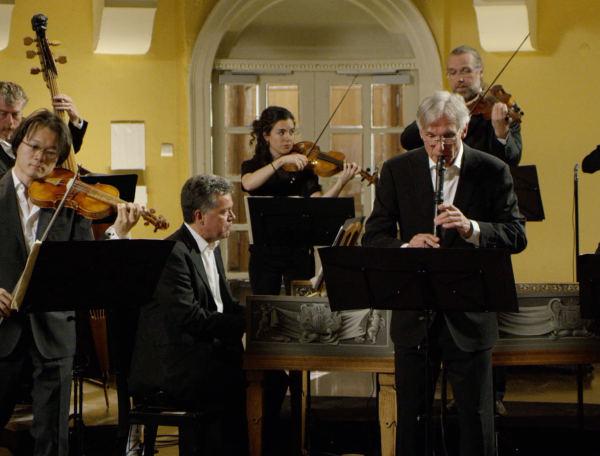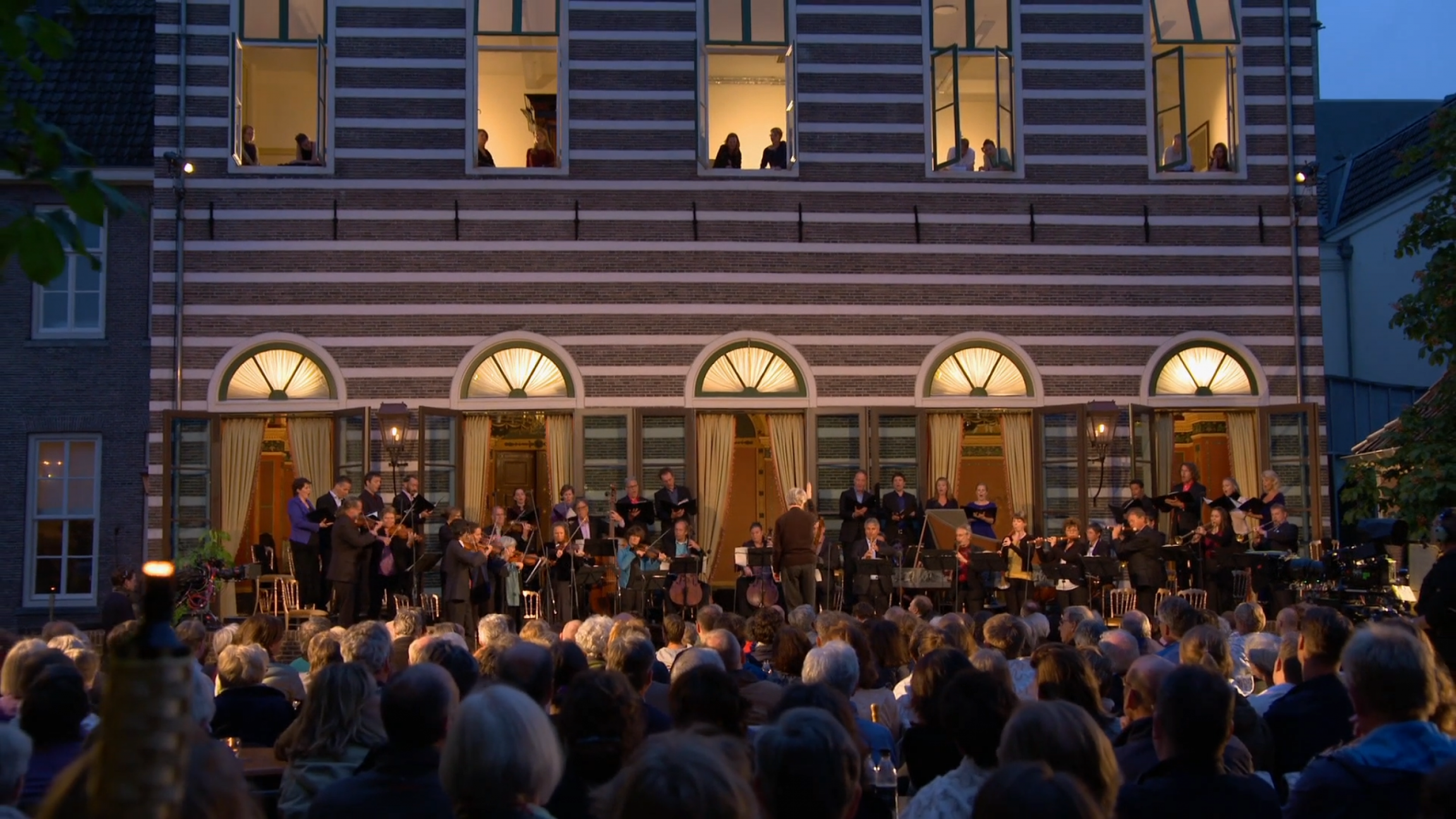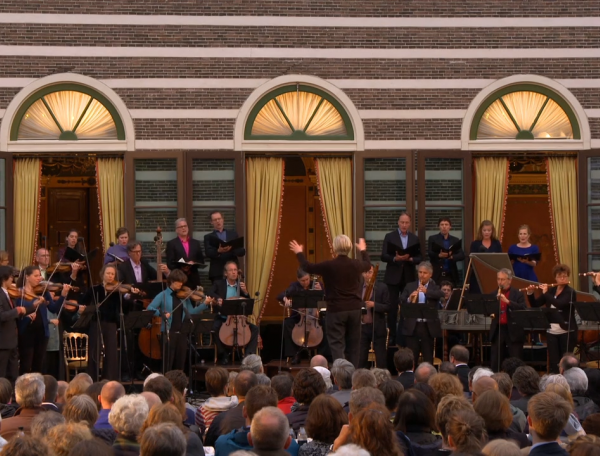

Auf, schmetternde Töne der muntern Trompeten
BWV 207a performed by the Netherlands Bach Society
conducted by Jos van Veldhoven
Courtyard Paushuize, Utrecht
Behind the music
Tribute to August
In his music, Bach gave a major role to the indispensable trumpets and timpani
In Leipzig, in 1735, this festive music was played to celebrate the name day of Friedrich August II, Elector of Saxony. Although his court was in Dresden, important occasions were also celebrated in Leipzig with ‘extraordinary’ concerts.
The libretto of Auf, schmetternde Töne is a typically eighteenth-century – and for modern ears rather exalted – ode to the virtues of the Elector and the ensuing prosperity of his subjects. The indispensable trumpets and timpani, to which Bach gave a major role in his music, enter immediately in the first line. Here, August is honoured mainly in his capacity as Elector of Saxony, although reference is also made to his Polish kingdom in the final recitative. The rivers Pleiβe and Elbe are cited as representatives of his kingdom. The text is also overflowing with the usual references to ancient antiquity.
Although it fits the words perfectly, the music of this cantata – with the exception of the recitatives – was not new. Bach had written most of it ten years earlier, for the inauguration of a university professor. And one part was even older. Informed listeners will easily recognise Brandenburg Concerto No. 1 in the opening chorus. The way in which Bach effortlessly turns one of his most beautiful and famous orchestral works into a perfect vocal composition demonstrates that for Bach the distinction between secular and sacred, and between instrumental and vocal is purely notional.
Secular cantatas
Actually, the terms ‘secular’ and ‘cantatas’ apply to Bach’s world only to a limited degree. To start off, Bach seldom used the word ‘cantata’ himself. The term only came into common use later on, when people wanted to organise Bach’s work into a clear and large-scale ‘oeuvre’. And in Bach’s day, the ‘secular’ aspect was mainly a question of motive and text, as from a musical point of view it can barely be distinguished from his liturgical music. There, too, trumpets and timpani are to be found, or a section from a ‘Brandenburg’ concerto can suddenly appear.
The secular cantatas were always composed for an important occasion: the name day, birthday, wedding, inauguration or death of either a dignitary of the city or a courtier from Dresden, for example. Around 15 secular cantatas have survived, although we know from surviving manuscripts that there must have been more. As in his sacred cantatas, Bach also often reused music in his secular cantatas, putting different words to the notes. And sometimes he put secular words to sacred cantatas and vice versa.
- BWV
- 207a
- Title
- Auf, schmetternde Töne der muntern Trompeten
- Genre
- cantatas
- Year
- 1735 BWV 207 dates from as early as 1726
- City
- Leipzig
- Lyricist
- unknown, probably Picander
- Occasion
- name day of Friedrich August II, Elector of Saxony and King of Poland
- First performance
- 3 August 1735
- Special notes
- For this festive music, Bach used the cantata he had written earlier: Vereinigte Zwietracht der wechselnden Saiten, BWV 207
With support from
Stichting Elise Mathilde Fonds, K.F. Hein Fonds
Extra videos
Vocal texts
Original
1. Marche
2. Chor
Auf, schmetternde Töne
der muntern Trompeten,
ihr donnernden Pauken,
erhebet den Knall!
Reizende Saiten, ergötzet das Ohr,
suchet auf Flöten
das Schönste zu finden,
erfüllet mit lieblichem Schall
unsre so süsse als grünende Linden
und unser frohes Musenchor!
3. Rezitativ (Tenor)
Die stille Pleisse spielt
mit ihren kleinen Wellen.
das grüne Ufer fühlt
itzt gleichsam neue Kräfte
und doppelt innre rege Säfte.
Es prangt mit weichem Moos und Klee;
dort blühet manche schöne Blume,
hier hebt zur Flora grossem Ruhme
sich eine Pflanze in die Höh
und will den Wachstum zeigen.
Der Pallas holder Hain
sucht sich in Schmuck und Schimmer zu erneun.
Die Castalinnen singen Lieder,
die Nymphen gehen hin und wieder
und wollen hier und dort bei unsern Linden,
und was? den angenehmen Ort
ihres schönsten Gegenstandes finden.
Denn dieser Tag bringt allen Lust;
doch in der Sachsen Brust
geht diese Lust am allerstärksten fort.
4. Arie (Tenor)
Augustus' Namenstages Schimmer
erklärt der Sachsen Angesicht.
Gott schützt die frommen Sachsen immer,
denn unsers Landesvaters Zimmer
prangt heut in neuen Glückes Strahlen,
die soll itzt unsre Ehrfurcht malen
bei dem erwünschten Namenslicht.
5. Rezitativ (Sopran, Bass)
Augustus' Wohl
ist der treuen Sachsen Wohlergehn;
Augustus' Arm beschützt
der Sachsen grüne Weiden,
die Elbe nützt
dem Kaufmann mit so vielen Freuden;
des Hofes Pracht und Flor
stellt uns Augustus' Glücke vor;
die Untertanen sehn
an jedem Ort ihr Wohlergehn;
des Mavors heller Stahl muss alle Feinde schrecken,
um uns vor allem Unglück zu bedecken.
Drum freut sich heute der Merkur
mit seinen weisen Söhnen
und findt bei diesen Freudentönen
der ersten güldnen Zeiten Spur.
Augustus mehrt das Reich.
Irenens Lorbeer wird nie bleich;
die Linden wollen schöner grünen,
um uns mit ihrem Flor bei diesem
hohen Namenstag zu dienen.
6. Arie (Sopran, Bass)
Mich kann die süsse Ruhe laben,
ich kann hier mein Vergnügen haben,
wir beide stehn hier höchst beglückt.
Denn unsre fette
Saaten lachen
und können viel Vergnügen machen,
weil sie kein Feind
und Wetter drückt.
Wo solche holde Stunden kommen,
da hat das Glücke zugenommen,
das uns der heitre Himmel schickt.
7. Ritornello
8. Rezitativ (Alt)
Augustus schützt
die frohen Felder,
Augustus liebt die grünen Wälder,
wenn sein erhabner Mut
im Jagen niemals eher ruht,
bis er ein schönes Tier gefället.
Der Landmann sieht mit Lust
auf seinem Acker schöne Garben.
Ihm ist stets wohl bewusst,
wie keiner darf in Sachsen darben,
wer sich nur in sein Glücke findt
und seine Kräfte recht ergründt.
9. Arie (Alt)
Preiset, späte Folgezeiten,
nebst dem gütigen Geschick
des Augustus grosses Glück.
Denn in des Monarchen Taten
könnt ihr Sachsens Wohl erraten;
man kann aus dem Schimmer lesen,
wer Augustus sei gewesen.
10. Rezitativ (Sopran, Alt, Tenor, Bass)
Ihr Fröhlichen, herbei!
Erblickt, ihr Sachsen und ihr grosse Staaten,
aus Augustus' holden Taten,
was Weisheit und auch Stärke sei.
Sein allzeit starker Arm stützt teils Sarmatien,
teils auch der Sachsen Wohlergehn.
Wir sehen als getreue Untertanen
durch Weisheit die vor uns erlangte Friedensfahne.
Wie sehr er uns geliebt,
wie mächtig er die Sachsen stets geschützet,
zeigt dessen Säbels Stahl,
der vor uns Sachsen blitzet.
Wir können unsern Landesvater
als einen Held und Siegesrater
in dem grossmächtigsten August
mit heisser Ehrfurcht itzt verehren
und unsre Wünsche mehren.
Ja, ja, ihr starken Helden, seht
der Sachsen unerschöpfte Kräfte
und ihren hohen Schutzgott
an und Sachsens Rautensäfte!
Itzt soll der Saiten Ton
die frohe Lust ausdrücken,
denn des Augustus fester Thron
muss uns allzeit beglücken.
Augustus gibt uns steten Schatten,
der aller Sachsen und Sarmaten Glück erhält,
der stete Augenmerk der Welt,
den alle Augen hatten.
O heitres, hohes Namenslicht!
O Name, der die Freude mehrt!
O allerwünschtes Angedenken,
wie stärkst du unsre Pflicht!
Ihr frohe Wünsche und ihr starke Freuden, steigt!
Die Pleisse sucht durch ihr Bezeigen
die Linden in so jungen Zweigen
der schönen Stunden Lust und Wohl zu krön'n
und zu erhöhn.
11. Chor
August lebe,
lebe, König!
O Augustus, unser Schutz,
sei der starren Feinde Trutz,
lebe lange deinem Land,
Gott schützt deinen Geist und Hand,
so muss durch Augustus' Leben
unsers Sachsens Wohl bestehn,
so darf sich kein Feind erheben
wider unser Wohlergehn.
Translation
1. March
2. Chorus
Arise, blaring tones
of high-spirited trumpets,
You thundering drums,
lift up your roar!
Charming strings, enchant the ear,
Upon flutes
search for exquisite beauty,
Satisfy with the lovely harmonies
Our sweet, green linden tress
And our happy choir of Muses!
3. Recitative
The quiet Pleiße plays
With its tiny ripples,
The green bank senses
Now new strength and likewise
Redoubled stirring sap within.
It is resplendent with soft moss and clover;
Many pretty flowers bloom there,
Here, to Flora’s great renown,
A plant raises itself on high
And displays its growth.
The lovely grove of Pallas
Endeavors to renew itself with beauty and light.
The Castalian Muses sing songs,
Nymphs stroll back and forth,
And seek, here and there among our lindens,
What? A pleasant spot
For their loveliest pastimes;
Since this day brings joy for everyone;
Yet in the breast of Saxons
This joy is strongest of all.
4. Aria
The radiance of August’s nameday
Illumines the faces of Saxons.
God protects virtuous Saxons always,
Since the dwelling of our country’s father
Shines forth today with beams of new joy,
Depicting our own reverence
For the treasured luster of his name.
5. Recitative
August’s health
Is the prosperity of faithful Saxons;
August’s arm protects
The green pastures of Saxony,
The Elbe assists
The merchant joyfully;
The splendor and opulence of the court
Displays August’s good fortune to us;
His subjects perceive
Their prosperity in all places;
The bright steel of Mars must frighten all enemies,
To protect us from all misfortune.
Therefore Mercury rejoices today
With his wise sons,
And detects in these sounds of joy
Traces of the early Golden Age.
August improves the kingdom.
Irene’s laurel will never wither;
The lindens will grow green and lovely,
In order, with their blossoms,
To contribute to this lofty name day.
6. Aria
Sweet peace can refresh me,
I can have contentment here,
Both of us are most highly delighted here.
For our rich
farms smile
And enjoy much pleasure,
Since no enemy
or storm threatens.
Wherever such gracious hours pass,
Happiness is possessed,
Which a cheerful heaven sends to us.
7. Ritornello
8. Recitative
August protects
the happy fields,
August loves the green forests,
When his exalted courage
Never flags in the hunt,
Until a fine beast has pleased him.
The farmer surveys with pleasure
The beautiful harvest of his lands;
It is always obvious to him
That none in Saxony shall live in want
As long as he trusts his fortune
And founds his strength properly.
9. Aria
Praise, o posterity,
With gracious Providence,
The great good fortune of August.
For in the monarch’s deeds
You can perceive Saxony’s well-being;
It will be known from their reflection
Who August must have been.
10. Recitative
Come forth, happy people!
Discover, o Saxons and great nations,
In August’s noble deeds,
What wisdom is and strength as well.
His ever mighty arm protects in part Sarmatia,
And in equal measure the welfare of Saxony.
We see, as his loyal subjects, by the wisdom
which has won for us the banner of freedom,
How dearly he loves us;
How powerfully he guards Saxony at all times
Is demonstrated by the steel of his saber,
Which flashes before our Saxon eyes.
The father of our country,
As a hero and conqueror,
We can now honor in this most powerful August
with ardent devotion,
And increase our good wishes.
Yes, yes, bold heroes, behold
the inexhaustible strength of the Saxon,
And their exalted divine protector,
and the nourishing sap of Saxony!
Now shall the sound of strings
Express our happy delight,
For the soundness of August’s throne
Must make us happy always.
August provides continual shade,
Which protects the fortunes of Saxony and Sarmatia,
He is the constant cynosure of the world,
In every eye.
O joyful, lofty radiant name!
O name that increases happiness!
O memorial most desired,
How you strengthen our loyalty!
Arise, good wishes and powerful joy!
The Pleisse and the linden trees,
Decked out in young foliage,
Wish also to crown and exalt the joy
and goodness of these happy hours.
11. Chorus
Long live August,
Live long, o King!
O August, our guardian,
Be the harsh foe’s opponent;
May you live long for your country,
And may God protect your soul and hand;
Then, through August’s life
Our welfare as Saxons will be confirmed.
Then no enemy will dare rise up
Against our prosperity.
Credits
-
- Release date
- 26 April 2019
-
- Recording date
- 10 June 2016
-
- Location
- Courtyard Paushuize, Utrecht
-
- Conductor
- Jos van Veldhoven
-
- Soprano
- Maria Keohane
-
- Alto
- Maarten Engeltjes
-
- Tenor
- Thomas Hobbs
-
- Bass
- Matthew Brook
-
- Ripieno soprano
- Orlanda Velez Isidro, Klaartje van Veldhoven, Marjon Strijk, Hilde van Ruymbeke
-
- Ripieno alto
- Barnabás Hegyi, Elsbeth Gerritsen, Gemma Jansen, Marleene Goldstein
-
- Ripieno tenor
- Ronald Threels, Kevin Skelton, Diederik Rooker, René Veen
-
- Ripieno bass
- Donald Bentvelsen, Matthew Baker, Martijn de Graaf Bierbrauwer, Pierre-Guy Le Gall White
-
- Violin 1
- Shunske Sato, Pieter Affourtit, Annabelle Ferdinand, Hanneke Wierenga
-
- Violin 2
- Sayuri Yamagata, Anneke van Haaften, Paulien Kostense
-
- Viola
- Staas Swierstra, Deirdre Dowling
-
- Cello
- Lucia Swarts, Richte van der Meer
-
- Double bass
- Robert Franenberg
-
- Traverso
- Marten Root, Doretthe Janssens
-
- Oboe
- Martin Stadler, Peter Frankenberg, Sarah Assmann
-
- Bassoon
- Benny Aghassi
-
- Trumpet
- Robert Vanryne, Fruzsina Hara, Mark Geelen
-
- Timpani
- Peppie Wiersma
-
- Harpsichord
- Siebe Henstra
-
- Director
- Simon Aarden
-
- Music director
- Myrthe van Dijk
-
- Musc recording
- Frank Mathijssen, Dylan Rosenkamp
-
- Music edit and mix
- Myrthe van Dijk Hans Brouwer
-
- Camera
- Jochem Timmermans, Merijn Vrieling, Emiel Jansen
-
- Lights
- Zen Bloot
-
- Lighting assistant
- Dicky Bloemraad, Patrick Galvin, Sam Vis
-
- Assistant director
- Ferenc Soetman
-
- Video engineer
- Vincent Nugteren
-
- Set technique
- Marco Korzelius
-
- Data handling
- Jesper Blok
-
- Project manager nep
- Peter Ribbens
-
- Stagiaires
- Tim van Dijk, Dennis den Hartog, Leon Mignon
-
- Interview
- Onno van Ameijde, Marloes Biermans
-
- Producer concert
- Imke Deters, Marco Meijdam
-
- Producer film
- Jessie Verbrugh
-
- With support from
- Stichting Elise Mathilde Fonds, K.F. Hein Fonds
Discover
Help us to complete All of Bach
There are still many recordings to be made before the whole of Bach’s oeuvre is online. And we can’t complete the task without the financial support of our patrons. Please help us to complete the musical heritage of Bach, by supporting us with a donation!

